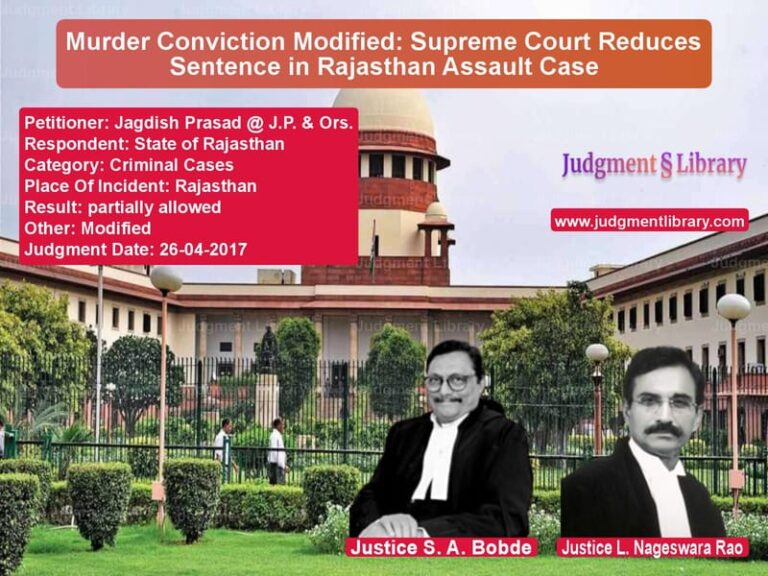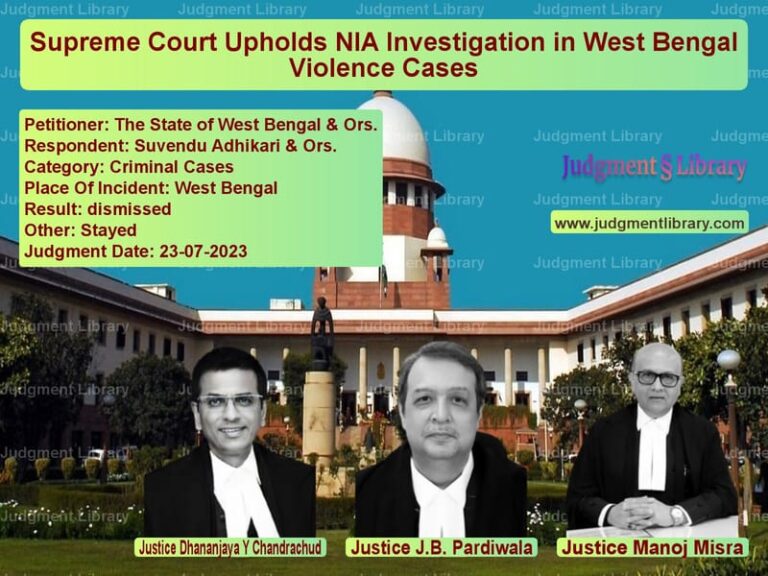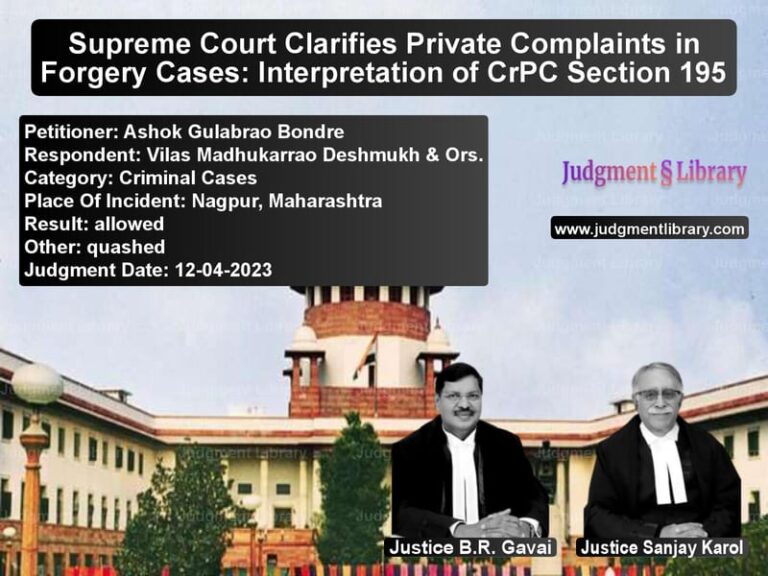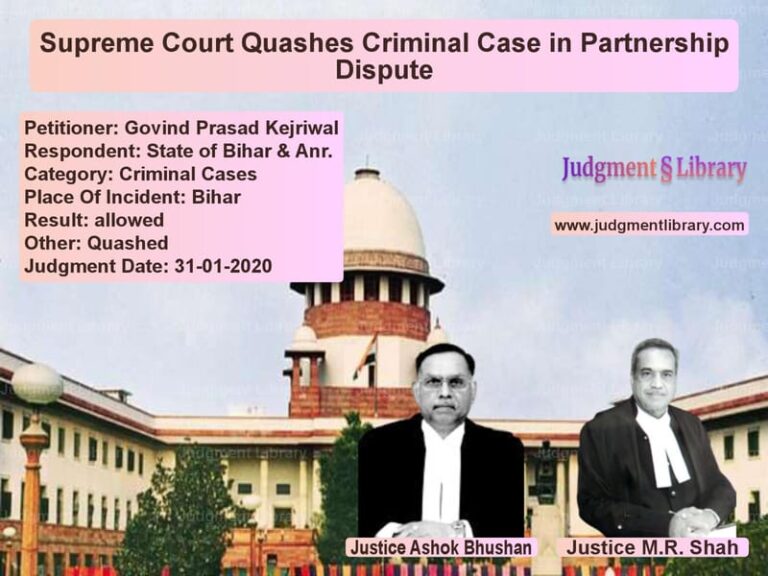Uttar Pradesh Police Promotion Exam: Supreme Court Dismisses Writ Petitions on Selection Process
The Supreme Court’s ruling in Arvind Kumar Tiwari & Others vs. The State of Uttar Pradesh & Others has settled a long-standing dispute regarding the declaration of results for the Sub-Inspector (Civil Police) Ranker’s Examination for the years 2000-2008. The case involved multiple petitioners who challenged the Uttar Pradesh Police Recruitment and Promotion Board’s decision to withhold their results and deny them the benefit of a previous Supreme Court judgment in Raghuraj Singh vs. State of Uttar Pradesh. The Court ultimately dismissed the petitions, ruling that the petitioners were ineligible for promotion based on their examination scores.
The ruling is significant as it upholds the importance of qualifying criteria in departmental examinations and reinforces the principle that courts cannot intervene in selection processes conducted over a decade ago unless clear illegality is proven.
Background of the Case
The Uttar Pradesh Police Recruitment and Promotion Board issued a notification on June 12, 2010, to fill 5,389 posts of Sub-Inspector (Civil Police) through promotion from eligible Constables and Head Constables. The recruitment was meant for vacancies from the years 2000 to 2008.
According to the Uttar Pradesh Sub-Inspector and Inspector (Civil Police) Service Rules, 2008, 50% of Sub-Inspector posts were to be filled by direct recruitment, while the remaining 50% were to be filled through a Departmental Examination. The written examination consisted of four sections:
- Hindi Essay (Law and Order case study) – 100 marks
- Basic Law, Construction, and Police Procedure (IPC, CrPC, Evidence Act) – 100 marks
- Numerical and Mental Ability Test – 50 marks
- Mental Aptitude, IQ Test, and Responding – 50 marks
The petitioners’ grievance stemmed from the fact that their results were not declared, and they were not given the same benefits as other candidates who had approached the Supreme Court earlier in the Raghuraj Singh case.
Petitioners’ Arguments
The petitioners contended:
- That their examination results were never declared, violating their right to fair consideration.
- That the benefit of the Raghuraj Singh judgment should have been extended to them.
- That there were still vacancies available, and they should be considered for promotion.
- That the recruitment process was arbitrary and discriminatory.
Respondents’ Arguments
The State of Uttar Pradesh and the Recruitment Board countered:
- That the petitioners had failed to secure the minimum 50% marks required in the objective sections of the exam.
- That only candidates who scored 50% or more in each objective subject were eligible for the next stage.
- That Hindi Essay papers of unsuccessful candidates were never evaluated, as per the Board’s decision of February 22, 2011.
- That the selection process was fair and followed the recruitment rules.
Supreme Court’s Observations and Judgment
Minimum Qualifying Marks Requirement
The Supreme Court upheld the Recruitment Board’s decision, stating:
“The examination process clearly stipulated that candidates must obtain a minimum of 50% in each subject to qualify for promotion. Those who failed to meet this criterion were rightly disqualified.”
Rejection of Parity with Raghuraj Singh Case
The Court clarified that the petitioners could not claim the same relief granted in Raghuraj Singh’s case, as they were fundamentally different:
“In Raghuraj Singh, the petitioners were found qualified for promotion. Here, the petitioners have failed to meet the eligibility criteria. The principle of parity does not apply in such cases.”
No Scope for Revisiting the 2010 Recruitment Process
The Court ruled that challenging a recruitment process over a decade later would be unreasonable:
“Selections conducted more than a decade earlier cannot be the subject matter of interference by this Court. The integrity of recruitment processes must be maintained.”
Legality of Not Declaring Results
The Court rejected the argument that non-declaration of results was unfair, holding:
“Since the petitioners were disqualified at the objective test stage, their marks in the Hindi Essay paper were never evaluated. This decision was taken before the examination and cannot be questioned now.”
Final Ruling
The Supreme Court dismissed the writ petitions, ruling that:
- The petitioners had failed to meet the selection criteria and were not entitled to relief.
- The recruitment process followed the rules, and there was no arbitrary action.
- Extending the benefit of Raghuraj Singh to unqualified candidates would be unjustified.
Key Takeaways from the Judgment
- Examination criteria must be strictly followed – Candidates who fail to meet qualifying marks cannot claim unfair treatment.
- Recruitment challenges must be timely – The Court refused to reopen a selection process conducted over a decade ago.
- Judicial intervention in promotions is limited – Courts cannot direct promotions for ineligible candidates.
- Legal precedents must be applied carefully – The Court clarified that the Raghuraj Singh case did not apply universally.
Conclusion
The Supreme Court’s ruling in Arvind Kumar Tiwari vs. State of Uttar Pradesh reaffirms that recruitment and promotion rules must be strictly adhered to. It emphasizes that candidates must meet minimum qualifying marks to proceed further in the selection process.
The judgment ensures that merit-based selection criteria remain sacrosanct while preventing undue judicial interference in recruitment matters long after their completion.
Petitioner Name: Arvind Kumar Tiwari & Others.Respondent Name: The State of Uttar Pradesh & Others.Judgment By: Justice L. Nageswara Rao, Justice Aniruddha Bose.Place Of Incident: Uttar Pradesh, India.Judgment Date: 26-07-2021.
Don’t miss out on the full details! Download the complete judgment in PDF format below and gain valuable insights instantly!
Download Judgment: arvind-kumar-tiwari-vs-the-state-of-uttar-p-supreme-court-of-india-judgment-dated-26-07-2021.pdf
Directly Download Judgment: Directly download this Judgment
See all petitions in Employment Disputes
See all petitions in Public Sector Employees
See all petitions in Recruitment Policies
See all petitions in Promotion Cases
See all petitions in Disciplinary Proceedings
See all petitions in Judgment by L. Nageswara Rao
See all petitions in Judgment by Aniruddha Bose
See all petitions in dismissed
See all petitions in supreme court of India judgments July 2021
See all petitions in 2021 judgments
See all posts in Service Matters Category
See all allowed petitions in Service Matters Category
See all Dismissed petitions in Service Matters Category
See all partially allowed petitions in Service Matters Category







